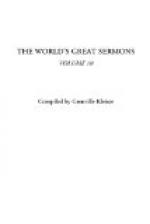Read the first letter of St. John, and everywhere it breathes the same spirit which we have found in the gospels and in St. Peter. John punctuates almost every paragraph with some reference to the cross. In the first chapter he is talking about sin. “The blood of Jesus Christ,” he says, “cleanses us from all sins.” In the second chapter he is talking about forgiveness, and this leads him to think at once of Jesus Christ, the righteous, “who is the propitiation for our sins, and not for ours only but for the sins of the whole world.” In the third chapter he is talking about brotherly love. He is urging the members of the Church to lay down their lives, one for another, “Hereby perceive we the love of God, because he laid down his life for us.” In the fourth chapter he tells of the great mystery of Christ’s love: “Herein is love, not that we loved God, but that he loved us, and sent his Son to be the propitiation for our sins.” To the beloved disciple evidently the great fact of the Christian revelation is that Christ died for our sins.
But it is in the letters of Paul that we find the fullest and most emphatic assertion of this transcendent fact. It will not be possible for me to quote to you even a half of what he said on the subject. If you should cut out of his letters all the references to the cross, you would leave his letters in tatters. Listen to him as he talks to his converts in Corinth: “First of all I delivered unto you that which I also received, how that Christ died for our sins.” That was the foremost fact, to be stated in every letter and to be unfolded in every sermon. To Saul of Tarsus, Jesus is not an illustrious Rabbi whose sentences are to be treasured up and repeated to listening congregations; He is everywhere and always the world’s Redeemer. And throughout all of Paul’s epistles one hears the same jubilant, triumphant declaration, “I live by the faith of the Son of God, who loved me and gave himself for me.”
Let us now turn to the last book of the New Testament, the Book of the Revelation. What does this prophet on the Isle of Patmos see and hear, as he looks out into future ages and coming worlds? The book begins with a doxology: “Unto him that loved us, and washed us from our sins in his own blood, to him be glory and dominion forever and ever.” John looks, and beholds a great company of the redeemed. He asks who these are, and the reply comes back, “These are they who have washed their robes and made them white in the blood of the Lamb.” He listens, and the song that goes up from the throats of the redeemed is, “Worthy art thou to take the book, and to open the seals thereof; for thou wast slain and didst purchase us for God with thy blood.” At the center of the great vision which bursts upon the soul of the exiled apostle, there is a Lamb that was slain. Whatever we may think of Jesus of Nazareth, there is no question concerning what the men who wrote the New Testament thought. To the men who wrote




